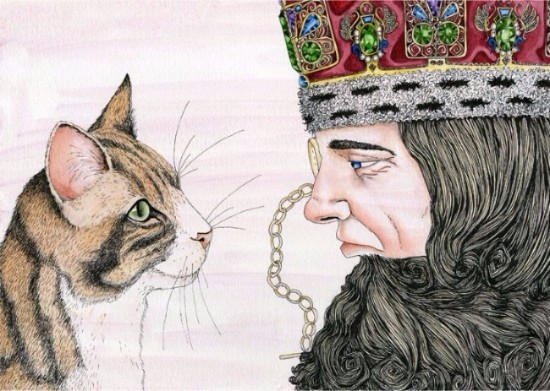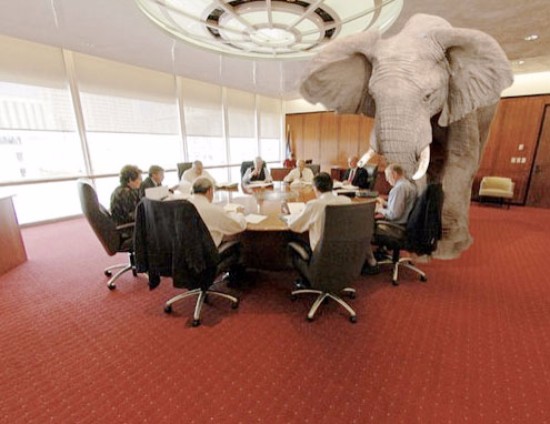Registered company: 10249645
London
United Kingdom
on... Corporate Culture: Cats, Kings and Elephants
The best service comes from institutions which positively encourage everyone – at whatever level – to ‘speak truth to power’ and willingly refer to the elephants which lurk in the corners of rooms before they grow from babies to adults and then are transformed into enormous woolly mammoths.
If even competent senior managers sweat with fear as they give a presentation to the CEO and Executive Committee… If at the 10-person weekly meeting only the boss and who s/he has chosen as punch-bag this week actually speak… If decisions are made only when it is clear which eyebrow the MD arches… then not only is the Titanic surging towards the iceberg but resources are being wasted on a vast scale.
The organisation is wasting the talents, intelligence, ideas, enthusiasm, conscientiousness, competence - and consequently a large percentage of the salaries - of its employees. Investors and shareholders may be concerned about the poor management of stock, energy, IT equipment, R&D budgets etc.... but how often are they concerned with the declining value of the corporate culture? Indeed, the newly appointed, financially astute and ruthlessly efficient team of directors may be responsible for a huge and highly commendable reduction of widget wastage and, simultaneously, a disastrous and extremely costly increase of diffidence and disenchantment amongst the workforce.
One problem is that dissecting a living frog will not reveal the secret of life.
Not everything which is fundamentally worthwhile can be measured with scientific accuracy, in a mechanistic way. Yes, the HR department can report on staff turnover, recruitment and retention. And the Comms department can organise before&after focus groups, record increasing participation levels and subject internal comments (if there are any in a climate of fear) to sentiment analysis. But because that (ironically rare) commodity – commonsense - is not usually a tool for determining ROI, ‘culture’ can end up being undervalued.
This may lead to a company turnaround strategy focusing on
Perestroika (reconstruction) while it fatally ignores Glasnost (openness).
But back to the Cats, Kings and Elephants…
Scenario:
A customer comes into their local branch of a large service organisation. They have a serious (elephant-sized) problem and are very upset. The frontline staff-member knows – in justice, and from a commonsense perspective - what to do to put things right. However, there has been a change of senior management and a new emphasis on budgeting, control and procedures. And there is a climate strongly coloured by redundancies as part of a series of restructures. The front-line staff-member reports the matter to their manager. In so doing, not wishing to be branded as ‘difficult’, they slightly under-egg the seriousness of the issue.
The manager consults the newly issued procedures manuals but feels that s/he might be ‘damned if they do and damned if they don’t’ so refers the issue upwards. For the same self-preserving reason as the frontline staff-member they don’t wish to stress the urgency and importance of the problem from the customer’s point of view because that would emphasise the inconvenience and cost to the organisation.
By the time the matter has reached the third level of report it looks as though the solution to the issue might set a precedent. If so, a policy ruling from a still higher authority would seem to be necessary.
By now of course, as a result of ratification by multiple layers of authority, the service and response have deteriorated and slowed dramatically. And the eventual decision by the King offers a mouse-sized solution to an elephant-sized problem… because the situation has been bled of its original emotional impact. His decision is therefore based on circumlocutory and tactful hints given by nervous and over-deferential juniors rather than being based on information about raw customer needs.
The answer is a real commitment to bottom-up communications and management in a goldfish bowl (see ‘on Internal Communications: Busting Silos’). If an institution has an atmosphere in which only a yes-man/woman will flourish it will not adhere to core values such as ‘taking personal responsibility’, ‘working together as a team’ and ‘telling it like it is’. It will become unresponsive to internal and external customers. The author Gunter Grass, said, “The job of a citizen is to keep his mouth open”. A good company culture is one which encourages – in a safe and productive manner - every employee to keep their mouth open.
A first-class chess-player is incapable of losing a capital piece to a pawn by mistake. A top-notch musician or sportsman/woman has practiced and trained so much that they have developed a really effective ‘muscle memory’.
A company with a culture of open, respectful and values-driven communication will be richly endowed with employees - from bottom to top - who have a service muscle memory. This is far more valuable than the most comprehensive procedures and manuals:
“Culture eats Strategy for breakfast”.




